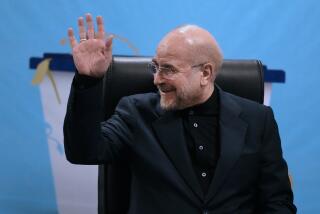Anti-Baath campaign a spur to Iraq Shiite voters
- Share via
Reporting from Najaf, Iraq — Currency trader Ahmad Sharbar, like many of the merchants in the teeming bazaar of this ancient Shiite city, had become disillusioned with Iraq’s new democracy.
He was upset with the failure of the government he voted for in 2005 to improve services or create jobs and with the endless political bickering in Baghdad that has paralyzed progress on many fronts.
He had even decided not to vote in Iraq’s national elections March 7 until he heard that hundreds of candidates were to be barred from the poll because of their alleged ties to the former Baath Party of Saddam Hussein.
“This news about the Baathists trying to come back to power made me very insistent to participate,” said Sharbar, 39, who fled the country under threat of death from the Baathist regime in the 1990s. “We all say the Baath Party is a malignant disease, and we all fear it will spread again.”
In Najaf, the religious capital of Shiite Islam, and elsewhere across the overwhelmingly Shiite Muslim south, which suffered greatly under the former regime’s brutality, the government decision to bar as many as 500 candidates has proved wildly popular, mushrooming into an anti-Baathist crusade that promises to dominate and define the election campaign, which officially began Friday.
Leaders of the two main Shiite blocs competing for the votes of the Shiite majority -- Prime Minister Nouri Maliki’s State of Law slate and the Iraqi National Alliance coalition of mostly religious parties -- have been vying to outdo each other with promises to clamp down on the allegedly resurgent Baath Party.
Election posters denouncing Baathists have appeared across Baghdad and the south. One features a prominent Sunni Arab lawmaker who was included on the list, with a big red cross over his face and the words “No to return of the Baathist criminals” written underneath.
There have been anti-Baathist demonstrations throughout Shiite areas, and a string of southern provinces, led by Najaf, has issued proclamations calling for the expulsion of all Baathists.
A series of deadly bombings in Baghdad and elsewhere, including attacks Friday that killed three people on the outskirts of Najaf, has been blamed by the government on Baathists, adding weight to the perception among Iraq’s Shiites that the Baath Party represents an immediate threat.
U.S. officials say they believe former Baathists play a minor role in supporting the Islamists of the Al Qaeda in Iraq militant group.
The Shiites’ mood flies in the face of five years of U.S. policy aimed at promoting reconciliation between Sunnis and Shiites and bodes ill for the prospects of future harmony now that American troops are preparing to head home.
U.S. and other Western diplomats in Baghdad have condemned the ban on the candidates, some of them members of the current parliament, fearing it will undermine the legitimacy of the elections.
When Shiite leaders talk about de-Baathification, as the process of removing Baathists is known, Sunnis feel targeted because the policy is applied unevenly, said Ahmed Alwan, a Sunni lawmaker.
But in Najaf, where just about everyone has a relative who was executed under Hussein and many experienced firsthand the tyranny of his rule, memories of the former regime’s brutality are still raw, eclipsing the more mundane issues of services, the economy and corruption that might otherwise have dominated the elections.
Just steps from the city’s gold-domed Imam Ali shrine, Shiite Islam’s holiest site, Said Hussam Shuba, 29, sells skimpy satin negligees in pink, red and white from a tiny stall. He’s no fan of the Shiite clerics empowered by Iraq’s new democracy, some of whom regularly try to force him to close his shop, but he views the Baathists as a far bigger threat.
“No one has suffered more at the hands of their own government than the Iraqi people did under Saddam,” said Shuba, whose uncle was executed by the Baathist regime in the 1980s. “We must never allow them to return, and so I realize I must definitely vote.”
Haidar Nizar, an independent political analyst in Najaf, believes the Shiite parties have deliberately overstated the Baathist threat to halt a swing away from sectarian politics that became apparent during last year’s provincial elections.
Shiite officials deny that was their goal, though they acknowledge the effect.
“It didn’t happen because of votes, but this will probably energize the people,” said Entifadh Qanbar, a spokesman for Ahmad Chalabi, who chairs the Accountability and Justice Commission, which ordered the ban on candidates. Both Qanbar and Chalabi are candidates representing the Iraqi National Alliance.
“It’s made the Baathist danger an imminent national issue,” Qanbar said, “and that will motivate people to vote.”
Times staff writer Caesar Ahmed in Baghdad and special correspondent Saad Fakhrildeen in Najaf contributed to this report.
More to Read
Sign up for Essential California
The most important California stories and recommendations in your inbox every morning.
You may occasionally receive promotional content from the Los Angeles Times.













